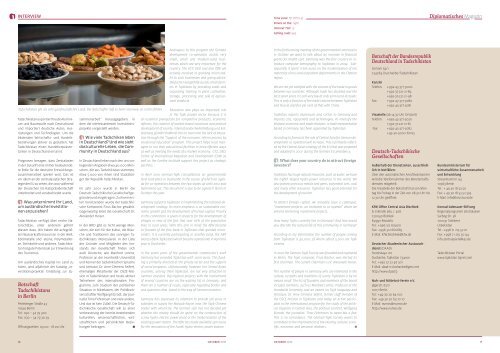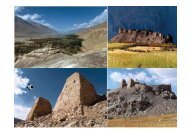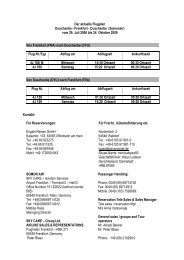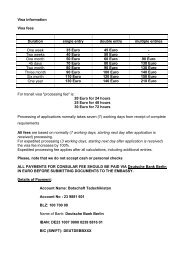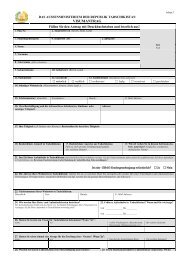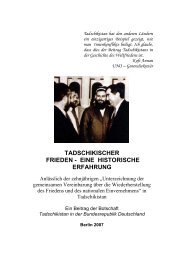dazu bitte hier klicken. - Botschaft der Republik Tadschikistan
dazu bitte hier klicken. - Botschaft der Republik Tadschikistan
dazu bitte hier klicken. - Botschaft der Republik Tadschikistan
Sie wollen auch ein ePaper? Erhöhen Sie die Reichweite Ihrer Titel.
YUMPU macht aus Druck-PDFs automatisch weboptimierte ePaper, die Google liebt.
INTERVIEW<br />
<strong>Tadschikistan</strong> gilt als sehr gastfreundliches Land. Der <strong>Botschaft</strong>er ließ es beim Interview an nichts fehlen<br />
<strong>Tadschikistan</strong> exportiert heute Aluminium<br />
und Baumwolle nach Deutschland<br />
und importiert deutsche Autos, Ausrüstungen<br />
und Technologien. Um die<br />
bilateralen Wirtschafts- und Handelsbeziehungen<br />
aktiver zu gestalten, hat<br />
<strong>Tadschikistan</strong> einen Handelsrepräsentanten<br />
in Deutschland ernannt.<br />
Prognosen besagen, dass Zentralasien<br />
in <strong>der</strong> Zukunft eine immer bedeuten<strong>der</strong>e<br />
Rolle für die deutsche Entwicklungszusammenarbeit<br />
spielen wird. Das ist<br />
vor allem an <strong>der</strong> zentralasiatischen Strategie<br />
<strong>der</strong> EU zu sehen, die 2007 während<br />
<strong>der</strong> Deutschen EU-Ratspräsidentschaft<br />
unterbreitet und verabschiedet wurde.<br />
Was unternimmt Ihr Land,<br />
um ausländische Investitionen<br />
anzuziehen?<br />
<strong>Tadschikistan</strong> verfügt über reiche Naturschätze,<br />
unter an<strong>der</strong>em gehört<br />
Wasser <strong>dazu</strong>. Wir haben die achtgrößten<br />
Wasserkraftressourcen in <strong>der</strong> Welt,<br />
Edelmetalle und -steine, Polymetallerze,<br />
Steinkohle und an<strong>der</strong>es. <strong>Tadschikistan</strong><br />
hat gute Potenziale zur Entwicklung<br />
des Tourismus.<br />
Um ausländisches Kapital ins Land zu<br />
holen, wird alljährlich <strong>der</strong> Katalog „Investitionsprojekte:<br />
Einladung zur Zu-<br />
<strong>Botschaft</strong><br />
<strong>Tadschikistan</strong>s<br />
in Berlin<br />
Perleberger Straße 43<br />
10559 Berlin<br />
Tel.: 030 – 34 79 300<br />
Fax: 030 – 34 79 30 29<br />
Öff nungszeiten: 09.00 - 18.00 Uhr<br />
sammenarbeit“ herausgegeben, in<br />
dem die interessantesten Investitionsprojekte<br />
vorgestellt werden.<br />
Wie viele Tadschiken leben<br />
in Deutschland? Und wie sieht<br />
das kulturelle Leben, die Community<br />
in Deutschland aus?<br />
In Deutschland leben nach den uns vorliegenden<br />
Angaben etwa 40.000 Menschen,<br />
die aus <strong>Tadschikistan</strong> stammen,<br />
etwa 5.000 von ihnen sind Staatsbürger<br />
<strong>der</strong> <strong>Republik</strong> <strong>Tadschikistan</strong>.<br />
Im Jahr 2001 wurde in Berlin die<br />
Deutsch-Tadschikische Gesellschaft gegründet<br />
und eingetragen. Zu ihrem ersten<br />
Vorsitzenden wurde <strong>der</strong> tadschikische<br />
Komponist Firus Bachor gewählt.<br />
Gegenwärtig leitet die Gesellschaft Dr.<br />
Alexan<strong>der</strong> Heiser.<br />
In <strong>der</strong> BRD gibt es nicht wenige Menschen,<br />
die sich für die Kultur, die Bräuche<br />
und Traditionen des sonnigen <strong>Tadschikistan</strong>s<br />
interessieren. In <strong>der</strong> Liste<br />
<strong>der</strong> Grün<strong>der</strong> und Mitglie<strong>der</strong> des Vorstands<br />
<strong>der</strong> Gesellschaft fi nden sich<br />
auch Deutsche, wie Manfred Lorenz,<br />
Professor an <strong>der</strong> Humboldt-Universität<br />
und Kenner <strong>der</strong> tadschikischen Sprache<br />
und Literatur, Dr. Arne Clemens Seifert,<br />
ehemaliger Mitarbeiter <strong>der</strong> OSZE-Mission<br />
in <strong>Tadschikistan</strong> und heute aktiver<br />
Teilnehmer des internationalen Programms<br />
zum Studium <strong>der</strong> politischen<br />
Situation in Mittelasien, <strong>der</strong> Politikwissenschaftler<br />
Wolfgang Etzrodt, <strong>der</strong> Journalist<br />
Timo Fehrensen und viele an<strong>der</strong>e.<br />
Und das ist kein Zufall. Die Deutsch-Tadschikische<br />
Gesellschaft will zu einer<br />
Verbesserung <strong>der</strong> bereits bestehenden<br />
kulturellen, wissenschaftlichen, wirtschaftlichen<br />
und persönlichen Beziehungen<br />
beitragen.<br />
Analogous to this program the German<br />
development co-operation assists very<br />
small, small and medium-sized businesses<br />
which are very important for the<br />
country. The GTZ, DED and also KfW are<br />
actively involved in granting microcredits<br />
to such businesses and giving advice.<br />
Deutsche Hungerhilfe assists small farmers<br />
in Tajikistan by providing seeds and<br />
organizing training in plant cultivation,<br />
storage, processing and sale of agricultural<br />
products.<br />
Education also plays an important role<br />
in the Tajik private sector because it is<br />
an essential prerequisite for competitive products, economic<br />
reforms, the creation of market-based structures and positive<br />
development of society. Internationale Weiterbildung und Entwicklung<br />
gGmbH (InWent) tries to overcome the lack of education<br />
through the “Support of the economic reform process by<br />
vocational education” program. This project helps local managers<br />
to run their educational facilities in more effi cient ways<br />
as well as meeting the needs of a market economy. GTZ, DED,<br />
Centre of International Migration and Development (CIM) as<br />
well as the Goethe Institute support this project as strategic<br />
partners.<br />
In April 2010 German-Tajik consultations on governmental<br />
level took place in Dushanbe in the course of which an agenda<br />
for co-operation between the two states up until 2012 was<br />
hammered out. This document is due to be signed in Bonn in<br />
October this year.<br />
Germany supports Tajikistan in implementing the national development<br />
strategy. Its main emphasis is on sustainable economic<br />
growth and the development of human capital. Priority<br />
in this connection is given to projects for the development of<br />
villages in view of the fact that over 70% of the population<br />
lives in rural areas. With this aim in mind the KfW became<br />
co-foun<strong>der</strong> of the fi rst bank in Tajikistan that granted microcredits.<br />
It is currently participating in another bank, the ABT<br />
(Access Bank Tajikistan) which became operational in April this<br />
year in Dushanbe.<br />
In the seven years of the governmental commission‘s work<br />
Germany has provided Tajikistan with 120m euros. This funding<br />
is primarily directed at the private sector and the support<br />
of social programs. Unfortunately, however, the Central Asian<br />
countries, among them Tajikistan, are not very attractive to<br />
German investors. Big regional projects with the involvement<br />
of several countries are on the waiting list in Germany, and<br />
there are a number of issues, especially regarding bor<strong>der</strong> and<br />
visa questions that stand in the way of German investors.<br />
Germany has expressed its intention to provide 5m euros in<br />
subsidies to supply the Margab Rayon near the Tajik-Chinese<br />
bor<strong>der</strong> with electricity. The German side has not decided yet<br />
whether the money should be spent on the construction of<br />
a new hydro-electric power plant or the mo<strong>der</strong>nization of the<br />
existing power station. The KfW has made available 25m euros<br />
for the renovation of the Nurek hydro-electric power station.<br />
Time zone: TJT (UTC+5)<br />
Drives on the: right<br />
Internet TLD: .tj<br />
Calling code: 992<br />
In the forthcoming meeting of the governmental commission<br />
in October we want to talk about an increase in fi nancial<br />
grants for health care. Germany was the fi rst country to introduce<br />
computer tomography to Tajikistan in 2004. Subsequently<br />
it spent 17.6m euros on the mo<strong>der</strong>nization of ten<br />
maternity clinics and outpatient departments in the Chatlon<br />
region.<br />
We are not yet satisfi ed with the volume of the trade in goods<br />
between our countries. Although trade has doubled over the<br />
past seven years it is still very low at only 30m euros last year.<br />
This is only a fraction of the trade volume between Tajikistan<br />
and Russia and fi ve per cent of that with China.<br />
Tajikistan exports aluminium and cotton to Germany and<br />
imports cars, equipment and technologies. To intensify the<br />
bilateral economic and trade relations, a trade representative<br />
based in Germany has been appointed by Tajikistan.<br />
According to forecasts the role of Central Asia for German development<br />
co-operation will increase. This is primarily refl ected<br />
by the Central Asian strategy of the EU that was proposed<br />
and adopted in 2007 during the German EU presidency.<br />
What does your country do to attract foreign<br />
investors?<br />
Tajikistan has huge natural resources, such as water; we have<br />
the eighth largest hydro-power resources in the world. We<br />
also possess precious metals and gems, polymetal ores, coal<br />
and many other resources. Tajikistan has good potential for<br />
the development of tourism.<br />
To attract foreign capital, we annually issue a catalogue,<br />
“Investment projects: an invitation to co-operate” where we<br />
present interesting investment projects.<br />
How many Tajiks currently live in Germany? And how would<br />
you describe the cultural life of this community in Germany?<br />
According to my information the number of people coming<br />
from Tajikistan is 40,000, of whom about 5,000 are Tajik<br />
citizens.<br />
In 2001 the German-Tajik Society was founded and registered<br />
in Berlin. The Tajik composer, Firus Bachor, was elected its<br />
fi rst chairman. The current chairman is Dr. Alexan<strong>der</strong> Heiser.<br />
The number of people in Germany who are interested in the<br />
culture, customs and traditions of sunny Tajikistan is by no<br />
means small. The list of foun<strong>der</strong>s and members of the board<br />
includes Germans, such as Manfred Lorenz, Professor at the<br />
Humboldt University and an expert on Tajik language and<br />
literature, Dr. Arne Clemens Seifert, former staff member of<br />
the OSCE mission in Tajikistan and today an active participant<br />
in the international program for the study of the political<br />
situation in Central Asia, the political scientist, Wolfgang<br />
Etzrodt, the journalist, Timo Fehrensen to name but a few.<br />
This is no coincidence. The German-Tajik Society wants to<br />
contribute to the improvement of the existing cultural, scientifi<br />
c, economic and personal relations.<br />
<strong>Botschaft</strong> <strong>der</strong> Bundesrepublik<br />
Deutschland in <strong>Tadschikistan</strong><br />
Somoni 59/1<br />
734064 Duschanbe/<strong>Tadschikistan</strong><br />
Kanzlei<br />
Telefon: +992-43-377-3000<br />
+992-37-221-21-89<br />
+992-37-221-21-98<br />
Fax: +992-43-377-3080<br />
+992-43-377-3081<br />
Visastelle (ab 14.30 Uhr Ortszeit)<br />
Telefon: +992-43-377-3020<br />
+992-37-221-21-81<br />
Fax: +992-43-377-3082<br />
+49-30-5000-67105<br />
Deutsch-Tadschikische<br />
Gesellschaften<br />
Außerhalb <strong>der</strong> Dienstzeiten, ausschließlich<br />
in Notfällen:<br />
Über den automatischen Anrufbeantworter<br />
wird die Telefonnummer des Bereitschaftsdienstes<br />
mitgeteilt.<br />
Die Visastelle <strong>der</strong> <strong>Botschaft</strong> hat von Montag<br />
bis Freitag in <strong>der</strong> Zeit von 08.30 Uhr bis<br />
12.30 Uhr geöff net.<br />
KfW Offi ce Central Asia Bischkek<br />
B. Erkindik 58a, r. 308<br />
720040 Bishkek<br />
Kyrgyz Republic<br />
Tel.: +996 312 625910<br />
Fax: +996 312 660685<br />
E-Mail: KfW.Bischkek@kfw.de<br />
Deutscher Akademischer Austauschdienst<br />
(DAAD)<br />
Sovetskaya 107<br />
Dushanbe, Tajikistan 734001<br />
Tel.: +992 37 22 46 301<br />
E-Mail: daad-ic-dushanbe@gmx.net<br />
http://www.daad.tj<br />
Nah- und Mittelost-Verein e.V.<br />
Jägerstr. 63 D<br />
10117 Berlin<br />
Tel.: +49 30 20 64 100<br />
Fax: +49 30 20 64 10 10<br />
E-Mail: numov@numov.de<br />
http://www.numov.de<br />
Bundesministerium für<br />
wirtschaftliche Zusammenarbeit<br />
und Entwicklung<br />
Stresemannstr. 94<br />
10963 Berlin<br />
Tel.: + 49 30 18 53 50<br />
Fax: + 49 30 18 53 52 595<br />
E-Mail: info@bmz.bund.de<br />
Konrad-Adenauer-Stiftung<br />
Regionalprogramm Zentralasien<br />
Sarbog Str. 38<br />
100031 Tashkent<br />
Usbekistan<br />
Tel.: +998 71 215 52 01<br />
Fax: +998 71 255 30 94<br />
info.zentralasien@kas.de<br />
<strong>Tadschikistan</strong> Portal<br />
www.tajikistan.tajnet.com<br />
16 OKTOBER 2010<br />
OKTOBER 2010<br />
17


